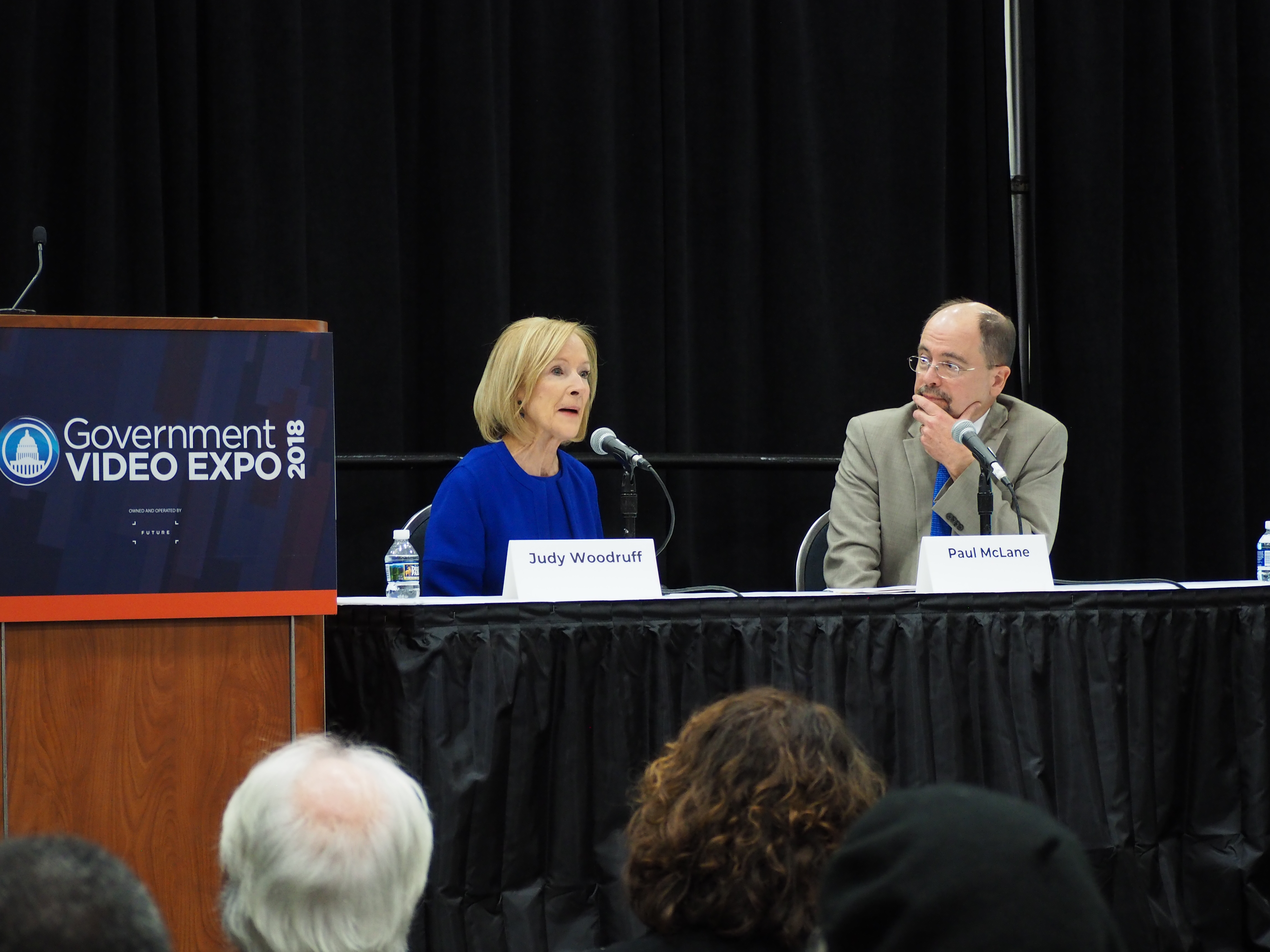‘PBS NewsHour’ Anchor Judy Woodruff Discusses Media Climate at 2018 GV Expo
WASHINGTON—Judy Woodruff, award-winning anchor and managing editor of “PBS NewsHour,” addressed the challenges of presenting a news program at a Government Video Expo keynote conversation with Paul McLane, managing director of content for Future US.

Woodruff was asked about maintaining integrity and credibility in today’s media climate where the perception of the American public is that the news is biased, fake or opinionated. She said the best way to combat that was “to do the best job we can to cover the news; to make sure we get our facts straight as best we can; to admit it when we make a mistake or when we find out some information we had wasn’t right; correct it as quickly as we can; and to be transparent about what we’re doing and how we’re gathering the news.
“We’ve got to be much better about separating out our own views as we share news on the air and in writing because we do run the risk of hurting our credibility. And in the end, all we really have is our credibility. If the people can’t trust what we’re reporting, if they can’t believe us, then we don’t really have value anymore. So that is the most precious thing we have and we have to guard that,” she said.
THE DECISION-MAKING PROCESS
Woodruff discussed the difficulties of preparing for each day’s program and praised the “PBS NewsHour” team. How much time do you spend on a particular piece of news? Should that be a topic covered that day? It is a day-long debate that the staff works on together to figure it out. And a final program can be completely scrapped for late-breaking news.
“It’s an ongoing conversation about what matters,” said Woodruff. “Every day it’s a discussion. Do we run three minutes or 90 seconds? Did we run the story last night? Can we do it better tomorrow night when there might be a more important guest available? We’re including these taped pieces that we’ve worked on for weeks and weeks at the same time we’re covering breaking news.
It’s a constant judgment call and decisions are being made right up until the time to air, according to Woodruff. “Sometimes there is a complete show prepared to go on the air and some late news causes you to throw the whole show out and start over. You have to be flexible,” she said. “Fortunately, I work with an amazing, flexible team of smart people.”
Get the TV Tech Newsletter
The professional video industry's #1 source for news, trends and product and tech information. Sign up below.
Today’s viewers have so many choices in how they receive their news. As Woodruff pointed out, in addition to the traditional broadcast networks, consumers also get their news from cable channels and social media.
“What that has meant for us at ‘PBS NewsHour’ is that, yes, we are still a traditional news program,” Woodruff said, “but we are also a place that is constantly thinking about how we reach people today where they are… Therefore, we are working on streaming; we work with Apple News; we work with Facebook; we work with so many of the folks who are digitally so far ahead of where we were when we just did television.
“Frankly, [‘PBS NewsHour’ has] an audience that has exploded in size in the last few years due to the interest in news,” she continued. “We have that legacy audience that we are bringing along with us, but at the same time we are reaching people through so many other ways that people couldn’t even imagine a few years ago.”
GETTING YOUR START
Woodruff didn’t actually plan to go into journalism as a career, having spent time as an intern on Capitol Hill. When she was told that Washington didn’t take women seriously, her professor suggested she cover politics as a reporter. After some entry-level newsroom positions and a brief stint as a weather girl, she was offered the position as a reporter covering the Georgia State Capitol and Atlanta politics.
“I thought I’d died and gone to heaven,” she said.
A teacher in the audience brought up the PBS NewsHour Student Reporting Lab program, in which her students participate. The labs are classrooms, after-school programs and clubs that produce original reports about how national and global issues affect local communities.
“The Student Reporting Lab is something I’m so proud of,” said Woodruff. “It’s one of my proudest things about the ‘PBS NewsHour.’ We work with high schools across the country, I think in all 50 states now. What the students have come up with will just blow you away. They see things that the rest of us don’t see.”
Asked about advice she could share as they teach students to maintain quality and integrity, but still keep them excited about telling stories that matter, Woodruff stressed the importance of values.
“In terms of what you give them, I think you give them the ability to imagine and create the news in the way they are conceiving it. At the same time you teach them the important values; the importance of getting your facts right; of talking to all the people involved. And of course, talk to them about doing quality work in the technical side of it. You may have the greatest story in the world, but if you can’t convey it, if it isn’t lit properly or if there’s no sound, you’ve got a problem. Teaching them values at the same time you’re teaching them the skills, is all matters.”
